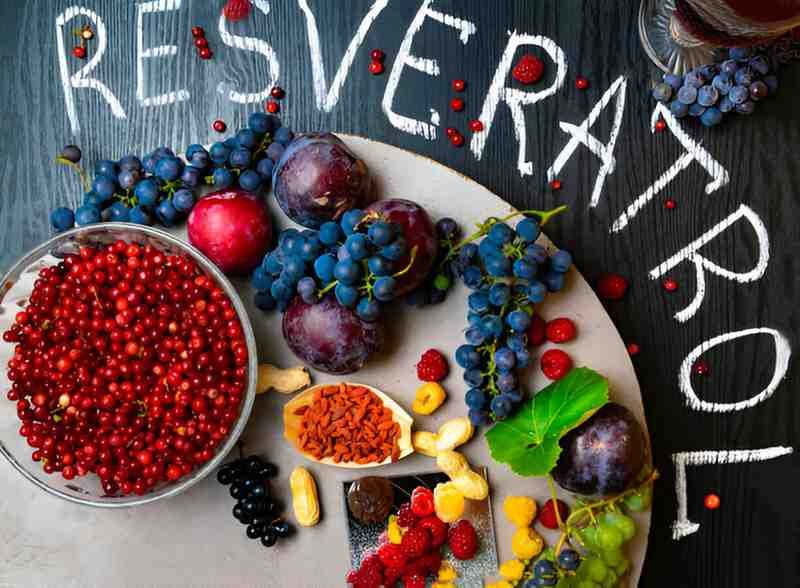Resveratrol is a natural compound found in certain plants, particularly in the skin of red grapes, peanuts, and berries. It has gained attention for its potential health-promoting properties, including its antioxidant and anti-inflammatory effects. In this article, we’ll explore the nutritional values, key health benefits, potential therapeutic uses, cautions, ways to incorporate resveratrol into your diet, and other relevant information.
Summary Table
| Aspect | Details |
|---|---|
| Nutritional Values | Present in small amounts in red grapes, peanuts, berries, and red wine |
| Key Health Benefits | Antioxidant properties, heart health, anti-inflammatory effects, potential cancer prevention |
| Cautions | Potential interactions with medications, high doses in supplement form |
| Incorporating into Diet | Red wine (in moderation), berries, grapes, peanuts |
Nutritional Values
Resveratrol is not considered a significant source of macronutrients like protein, fat, or carbohydrates since it is present in relatively small amounts in foods. However, it is valued for its bioactive properties and potential health benefits.
Key Health Benefits
- Powerful Antioxidant: Resveratrol is known for its potent antioxidant properties, which help protect cells from oxidative damage caused by free radicals. Antioxidants play a crucial role in reducing inflammation and lowering the risk of chronic diseases such as heart disease, cancer, and neurodegenerative disorders.
- Heart Health: Resveratrol has been linked to several cardiovascular benefits, including improving blood flow, reducing blood pressure, and lowering LDL cholesterol levels. These effects contribute to a lower risk of heart disease and stroke.
- Anti-Inflammatory Effects: Chronic inflammation is a contributing factor to many diseases, including arthritis, diabetes, and cardiovascular disease. Resveratrol’s anti-inflammatory properties help combat inflammation and may reduce the risk of developing inflammatory conditions.
- Potential Cancer Prevention: Some studies suggest that resveratrol may inhibit the growth of cancer cells and suppress the spread of tumors. While more research is needed to fully understand its anti-cancer effects, resveratrol shows promise as a potential preventive and therapeutic agent against certain types of cancer.
Potential Therapeutic Uses
Resveratrol has been studied for its potential therapeutic effects in various health conditions, including:
- Neurological Disorders: Resveratrol may help protect against neurodegenerative diseases such as Alzheimer’s and Parkinson’s disease by reducing inflammation, promoting the clearance of toxic proteins, and enhancing brain cell survival.
- Diabetes Management: Resveratrol has shown promising results in improving insulin sensitivity and glucose metabolism, making it a potential adjunctive therapy for managing diabetes and preventing complications associated with the disease.
Cautions
While resveratrol is generally considered safe for most people when consumed in moderate amounts from dietary sources, high doses in supplement form may have potential side effects or interactions with certain medications. It’s essential to consult with a healthcare professional before starting resveratrol supplementation, especially if you have underlying health conditions or are taking medication.
Incorporating Resveratrol into Your Diet
Resveratrol is naturally found in various foods, particularly in red grapes, red wine, peanuts, and berries such as blueberries, raspberries, and cranberries. Here are some tips for incorporating resveratrol into your diet:
- Enjoy Red Wine in Moderation: Red wine is one of the most well-known dietary sources of resveratrol. Enjoy a glass of red wine occasionally as part of a balanced diet, but avoid excessive alcohol consumption, which can have adverse health effects.
- Eat Berries and Grapes: Incorporate berries such as blueberries, raspberries, and strawberries, as well as red grapes, into your meals and snacks. These fruits not only provide resveratrol but also offer a wide range of other health benefits due to their rich antioxidant content.
- Include Peanuts: Snack on a handful of peanuts or add them to salads, stir-fries, or oatmeal for a nutritious boost of resveratrol and other beneficial nutrients.
Resveratrol is a natural compound with potent antioxidant and anti-inflammatory properties, offering numerous potential health benefits for heart health, cancer prevention, and neurological disorders. By incorporating resveratrol-rich foods into your diet and enjoying them in moderation, you can harness the health-promoting power of this remarkable compound to support your overall well-being.





